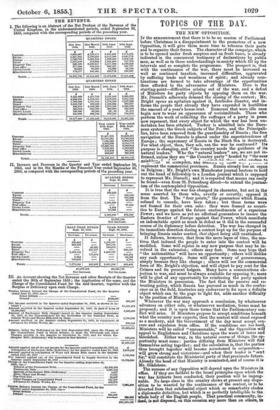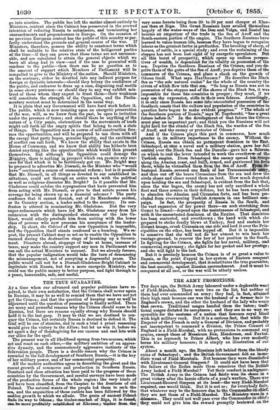TOPICS OF THE DA.Y.
THE NEW OPPOSITION.
IF the announcement that there is to be no session of Parliament before Christmas is a disappointment to the promoters of a new Opposition, it will give them more time to rehearse their parts and to organize their forces. The character of the campaign, which is to be opened under fresh auspices and on fresh bases, is already indicated in the concurrent testimony of declarations by publia men, as well as in those understandings in society which fill up the intervals and so complete the programme. The prospect is, that with the continuance of the war, there must be increased as well as continued taxation, increased difficulties, aggravated by suffering trade and weariness of spirit; and already com- binations are formed to take advantage of the opportunities thus afforded to the adversaries of Ministers. Here is the starting-point-difficulties arising out of the war, and a defeat of Ministers for party objects by opposing them on the war. Mr. Disraeli's adherents demand the closing of the contest; Mr. Bright opens an agitation against it, forebodes disaster, and in- forms the people that already they have expended in hostilities the amount of a year's house-rent. Rumours that were idle once begin now to wear an appearance of verisimilitude. Those who perform the work of collecting the suffrages of a party in posse now represent, that every object for which the war has been un- dertaken has been attained. Turkey is admitted into the Euro- pean system ; the Greek subjects of the Porte, and the Principali. ties, have been removed from the guardianship of Russia ; the free navigation of the Danube is placed under the superintendence of Europe' the supremacy of Russia in the Black Sea is destroyed. For what object, then, they ask, can the war be continued ? Its purpose is changing, and "the country needs the guidance of its natural leaders.' Who the "natural leaders" are, we are not in- formed, unless they ..., are "the Country headed by "the near , _ u._u,,„im..neijAr 7irampden, anti 11Bnio6cu.use
represent the commercial provinces. Russia already has an organ in Belgium ; Mr. Bright's own Manchester journal hastens to hold out the hand of fellowship to a London journal which is supposed to represent Mr. Disraeli ; and it is reported that means can easily be found-even from St. Petersburg direct-to extend the journal. ism of the contemplated Opposition.
It is true that the war has changed its character, but not in the sense asserted by those who, overtly or covertly, opposed it from the first. The "four points," the guarantees which Russia refused to concede, have been taken ; but those terms were not framed for their own sake : they were framed as securi- ties to Europe against the future encroachments of a rapacious Power; and we have as yet no effectual guarantees to insure the Eastern frontier of Europe against that Power, which manifests an indomitable spirit as much in defeat as it did in the successful course of its diplomacy before detection. The war has changed in its immediate direction during a contest kept up for the purpose of bringing Russia under control, that object being still unattained. It follows, however, that from the mere lapse of time, the mo- tives that induced the people to enter into the contest will be modified. Some will rejoice in any new purpose that may be in- volved in the extension; others may fear. Some may hope that "the nationalities" will have an opportunity ; others will dislike any such opportunity. Some will grow weary of perseverance, simply because they like change ; others will see the commercial force of Mr. Bright's objection, and will object to pay rent for the Crimea and its present lodgers. Many have a conscientious ob- jection to war, and must be always available for opposing it ; more will be glad of any opportunity for reinforcing the party against the Ministers in possession. The fact that the passive and re- treating policy, which Russia has pursued as much in the confer- ence as in the field, frustrates any endeavour to fix upon a definite object which can be the gage to fight for, adds another difficulty to the position of Ministers.
Whenever the war may approach a conclusion, by whatsoever
advances on either side, or whatsoever mediation, terms must be proposed; and it is upon those terms that the Parliamentary con- flict will arise. If Ministers propose to accept conditions beneath what the country now expects, then the contest will stand exposed as a mockery, and the Government of the day must accept cen- sure and expulsion from office. If the conditions are too bard, Ministers will be called "unreasonable," and the Opposition will appeal to Englishmen and Christians upon the waste of taxes and bloodshed. Either way, in the natural course of things, the op- portunity must come : parties differing from Ministers will find themselves acting together ; and the calculation is, that the parties thus brought together will become accustomed to cooperation- will grow strong and victorious-and when their leader is "sent for," will constitute the Ministerial party of that proximate future. Already the head of that Ministry is nominated, and of course it is Mr. Gladstone. The success of any Opposition will depend upon the Ministers in office. If they are faithful to the broad principles upon which the war has hitherto been conducted, their position will be impreg- nable. No large class in the country shows at present any dispo- sition to be wearied by the continuance of the contest, or to be diverted from that substantial object which so remarkably eludes a diplomatic definition, but which is so perfectly intelligible to the whole body of the English people. That practical community, in- deed, is not disposed, on this occasion any more than on others, to
go into niceties. The public has left the matter alinostentirely to Ministers, content since the Cabinet has persevered in the avowed intention of reducing Russia to submiceion, and terminating her eneroaehments and preponderance in Europe. On the occasion. of no previous European contest has the public of this country so per- fectly understood the grounds and general-course of the war. If Ministers, therefore, possess the ability, to construct terns which shall be suitable to the relative state of the belligerent parties at the time—if they can prove that those terms are not unreason- able, and are calculated to attain the general objects which we have all along had in view—and if the case be presented with
candour to the public—then there can lie no question as to the amount of support which Members of Parliament *ill be compelled to give to the Ministry of the nation. Should Ministers, on the contrary, either be diverted info any indirect purpose for foreign or dynastic interests—shoull they betray the confidence of the public, and endeavor to dress up a case, disguising real merit-8 in some showy pretence—or should they in any, way exhibit mile trust of those whom they expect to trust them,—their weakness- will constitute the strength of the Opposition, and" the Faille- mentary contest must be determined itethe usual way. It is plain that any Government will have- hard work before it. The public, which is now insisting upon an energetic prosecution of the war, will, as we know from the past, be open to irritation under the prestinre of taxes; and should there be anything of the nature of a City panic, obstrnotions to the Movements of trade might call forth all the angry spirits that belong to such a State of things. The Opposition now in course of self-construction fore- sees the opportunities, and- will be prepared to use them with all the energy that narty hopes, genuine bigotry, and the excite'ment of conflict can call forth. We know the ability, that exists in the House of Commons; and we know that ability has hitherto been denied-anythinglike the Opportunities Which would then precept themselves. But although the Opposition could damage the krialitry, there is nithing in prospect Which can _promise any suc- cess for that which is to be factitiously got up. Mr. Bright -say be prepared to advertise Mr. Disraeli, a&the Minister who "would have continued a course of economical reform; but is it possible that Mr. Disraeli, in all things se devoted to our established in- lititutions, could act through an entire week with the political as well as religious-dissenter Mr. Bright P Is it possible that Mr. Gladstone could subdue the repugnances that have prevented him from acting with Mr. Disraeli, or give to that astute person his revenge for being shown up as a financial schemer ? The party confesses that it cannot furnish, out of its Manohester section, or its Country section, a leader suited to the country. Its con- ftssion is uttered in nominating Mr. Gladstone. But the very super-refinements which have led MT. Gladstone away from his cennexion with the distinguished statesmen of the late Ca- binet would utterly preclude him from uniting with the lower class of persons who now presume his acceptance of the leader- ',hip. In short, the Cabinet of the new Opposition is impossible, and the Opposition itself stands confessed as a humbug. We re- peat, the present Cabinet may so act as to enable the Opposition to suceeed during the destructive stage of breaking up a Govern- anent Disasters abroad; stoppage of huge at home, increase of taxes, may make the country support any men in Parliament who can call the actual Ministers to account. But we already. foresee, that the popular indignation would take the turn of denouncing the mismanagement, not of accepting a disgraceful peace. The public would call no for a Disraeli-Gladstone-Bright Cabinet to capitulate with Russia, but for a more energetic Ministry, who could use the public money to better. purpose, and fight through to a peace, honourable, safe, and useful.



























 Previous page
Previous page